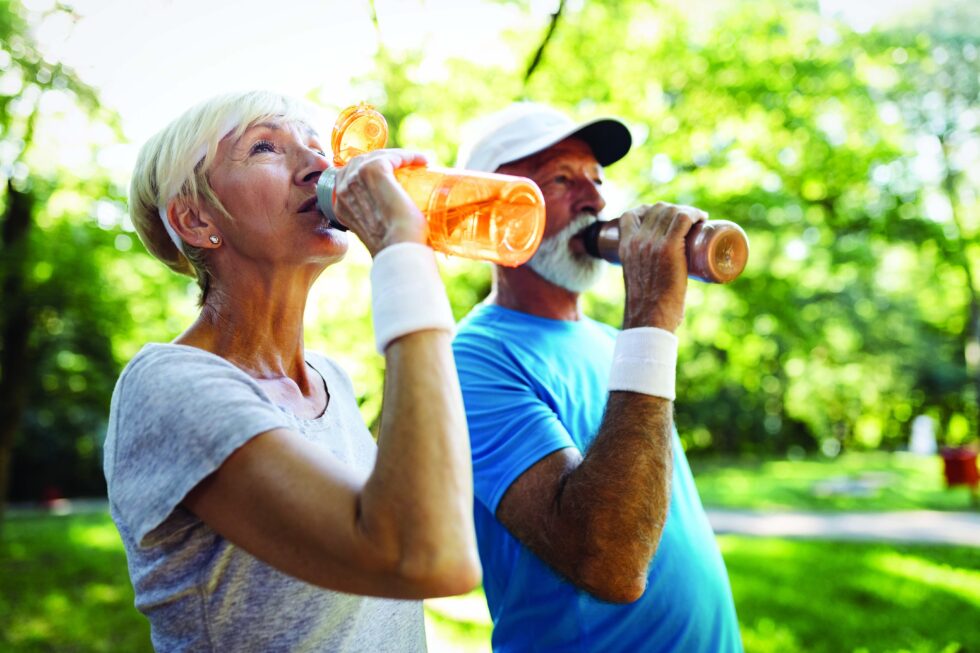
By Thomas Moll
Director of Content & Innovation
Are you ready for summer? If you’re anything like me, you’re probably excited to get outside without worrying about the erratic spring weather. With that said, summer can come with its share of challenges for our health and wellness.
Depending on where you live, the heat of summer can be anywhere from pleasantly warm to oppressively hot. Though I now live in the Midwest, I periodically like to check the weather where I grew up in South Texas. As I check, the temperature in McAllen is 100 degrees. Weather this warm can make it hard to keep up with one of the most important things our body needs—water!
Water does a lot for our bodies. It delivers important nutrients and oxygen to our cells. Our blood’s main property is water. It gives our vital organs cushion and even helps to convert food to energy. With as much as our body relies on water, it makes sense that, even if it’s not hot and we’re not sweating, we still need to consume water to stay hydrated.
How do you know if you’re becoming dehydrated?
Signs of mild dehydration are fatigue, headaches, muscle cramps in arms and legs, or even a sense of confusion or decreased cognitive function.
When dehydration gets worse, so does its effects on our body. According to the National Council on Aging, “Dehydration is a potentially serious condition that … can lead to complications ranging from urinary tract infections, heat stroke, heart problems, kidney failure, and blood clot complications. Since dehydration affects the health of your cells, it can also lower your body’s ability to ward off infections and heal from injury or illness.”
There’s been research recently on exactly how much water we need to drink each day in order to stay hydrated. For a long time, eight glasses of water was the simplest advice, though this isn’t necessarily accurate considering the water we get from our food. If you’re looking for a simple way to calculate how much water to drink, a general rule is to take one third of your body weight in pounds and change that to ounces. Someone who weighs 150 pounds would want to drink 50 ounces of water each day.
With any of the recommendations offered here or anywhere else, the best thing you can do is to talk to your doctor about the best way you can stay hydrated. This is because a lot of factors can affect how much water you need to drink, including weight, any medical conditions you may have, and what prescriptions you’re currently taking.
Age also can complicate our hydration needs. As we get older, we tend to crave food and water less. Our body composition also changes, leaving us with less water to start our days. When doing physical activity, we also sweat more because our bodies get less effective in regulating body temperature.
With all of this being said, it’s tempting to want to stay indoors and as still as possible for a few months. Yet, there are ways to stay active while protecting yourself from losing too much water.
If you already have an activity that you love to do each day, just add a water bottle to take with you. There are many options to carry bottles, such as in a small pack or sleeve with a strap, so you don’t have to hold it while you move.
Also, many of us do not like the taste of plain water, so getting your full allotment for the day may be difficult. Consider giving your water a little flavor by adding some natural flavoring with sliced fruit or cucumber. Sports drinks and electrolyte powders can be a great way to replace what we lose through sweat, such as magnesium and sodium. Just be careful to avoid drinks with a lot of added sugar. Also consider limiting alcohol and caffeine consumption as these are diuretics that take water out of your body.
If you’re concerned about working out in the heat, consider moving your activity indoors. Many gyms offer a variety of classes, different machines, and cooler workout options such as in a pool that will provide a nice break from the heat.
If you feel like a gym membership may be too expensive, check with your medical insurance to see if they offer any programs for seniors such as SilverSneakers, which offers free gym memberships for select Medicare plans. Go to tools.silversneakers.com to check your eligibility.
If you have outdoor activities you need to do such as gardening or lawn work, consider doing these at the coolest parts of the day. If there’s a heat advisory in your area, don’t push yourself. Your plants can bounce back a lot faster than your body if you get seriously dehydrated.
Be excited about this summer knowing that you can give your body the hydration it needs to stay healthy and active. Talk to your doctor about these tips and ask if they have anything that they would recommend to keep you feeling great in any season.
Cheers to a great summer!


